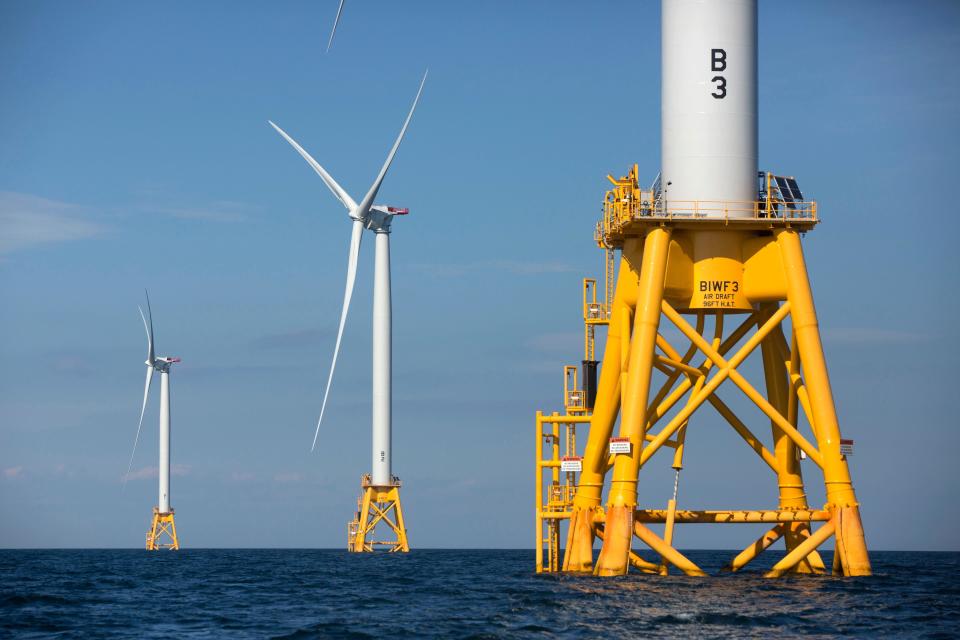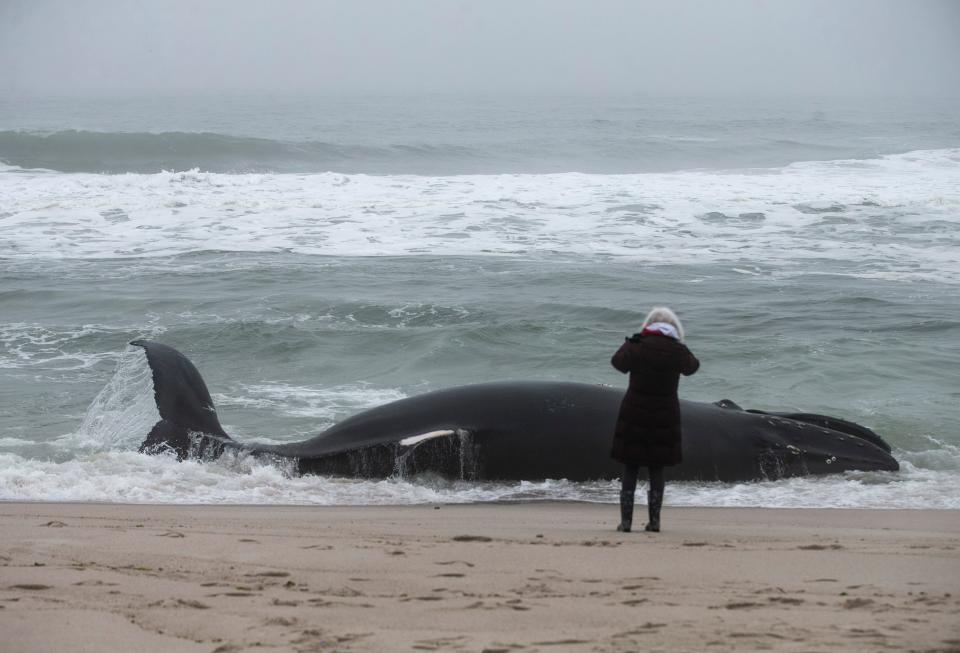Murphy to use $2 million in offshore wind funds on whale detection, seal studies
- Oops!Something went wrong.Please try again later.
- Oops!Something went wrong.Please try again later.
TRENTON — Gov. Phil Murphy announced Wednesday $2 million for three new offshore wind environmental projects, including the launch of a whale detection buoy, a study on animal diversity in the offshore wind lease areas, and funding to monitor offshore wind's impacts on New Jersey's harbor seal population.
The projects are funded through the state's Offshore Wind Research & Monitoring Initiative.
Political divisions have calcified around the potential environmental impacts of offshore wind construction and pitted Republicans and Democrats against one another across the nation.
The same fight is playing out in New Jersey.
On Wednesday, nine New Jersey members of Congress decried efforts to blame offshore wind for marine mammal deaths and called for federal action to address threats like ship strikes, marine debris entanglement and pollution.
“Opponents are funding attempts to blame offshore wind pre-construction activity for marine mammal deaths without scientific evidence," Reps. Frank Pallone Jr., Donald Payne Jr., Andy Kim, Bonnie Watson Coleman, Donald Norcross, Bill Pascrell Jr., Rob Menendez, Josh Gottheimer and Mikie Sherrill, all Democrats from New Jersey, wrote Wednesday in a letter to the chair of the White House Council on Environmental Quality.
As part of an agreement to development wind farms off New Jersey, developers Ørsted, based in Denmark, and Atlantic Shores Offshore Wind, a partnership between Shell New Energies and EDF Renewables, have committed about $26 million for environmental research and monitoring, according to the Murphy administration.

"These projects will continue to advance the collection of baseline scientific information that will help ensure the responsible development and operation of offshore wind facilities that protect our coastline and its natural resources," Commissioner of Environmental Protection Shawn M. LaTourette said in a news release.
The Research & Monitoring Initiative projects announced Wednesday include a $602,135 whale monitoring buoy project by the Woods Hole Oceanographic Institute. The buoy will listen for whales and be used in policy decisions, such as regulating ship speed limits, and be used to monitor underwater construction noise, according to state officials.
Another research initiative will record animal diversity through ocean surveys and sampling DNA in water near the offshore wind project areas. Researchers will use the information collected to predict impacts on the animals from farm construction. The $1.2 million research project will be conducted by Monmouth University, according to the Murphy administration.
Stockton University and the Atlantic Marine Conservation Society will perform a third project to better understand how harbor seals, which spend their winters north of Atlantic City, use the offshore wind areas. Researchers will tag the animals and monitor health data, such as stress hormones, during construction and operation of the farms.
Additional money from the state's Research & Monitoring Initiative will go toward New Jersey's membership into the Responsible Offshore Science Alliance, which provides science for fisheries industries operating in offshore wind farm areas. Offshore wind's impact on the fishing industry remains hotly debated. Some fisheries groups, like scallopers, have alleged the wind farms will make their operations prohibitively expensive by making prime harvest areas unusable.
Behind the debate
Since Dec. 1, 10 whales have died along New Jersey's coast. In addition, three groups of dolphins died in separate incidents and washed ashore in Sea Isle City, the Leonardo section of Middletown, and Sandy Hook.
Of the dead whales that were examined by marine mammal stranding experts in New Jersey since December, four had wounds that experts said were likely the result of ship strikes. The remaining whales either did not wash ashore, were too decomposed to examine, or samples were sent out for testing and the cause of death remains under investigation.
To protect endangered North Atlantic right whales, which are also at risk from ship strikes, the National Oceanic and Atmospheric Administration, or NOAA, has instituted speed limits of 10 knots for ships 65 feet and longer around the mouths of busy ports. The agency is in the process of considering new speed limit restrictions that would apply to smaller vessels.
The Congress members who wrote the Biden administration Wednesday urged the federal government to take action to address proven threats to whales, like ship strikes, entanglements with debris, and swallowing plastic pollution.

Blaming offshore wind "not only threatens our transition to emission-free clean energy sources that are necessary to help maintain healthy marine habitats and provide New Jerseyans with good-paying union jobs, but also distracts the public and policymakers from real solutions," the New Jersey congressional representatives wrote in their letter.
But some politicians and activist groups blame offshore wind development work — particularly underwater sonar mapping of the seafloor and the noise from soil boring — for recent marine mammal deaths.
Rep. Chris Smith, a Republican who represents portions of Monmouth and Ocean counties, said: "The whales are the canaries in the coal mine. They're telling us something that we all need to listen to: the entire ecosystem of our oceans will be devastated by this effort."
Earlier this month, Monmouth County Commissioners called for a moratorium on offshore wind preconstruction work until the whale deaths are thoroughly investigated.
Federal agencies acknowledge that human-generated ocean noise can affect marine animals in different ways, but officials at NOAA say no whale deaths have been attributed to offshore wind farms. Agency officials said they are continuing to gather data on the whale deaths.
Amanda Oglesby is an Ocean County native who covers Brick, Barnegat and Lacey townships as well as the environment. She has worked for the Press for more than a decade. Reach her at @OglesbyAPP, aoglesby@gannettnj.com or 732-557-5701.
This article originally appeared on Asbury Park Press: NJ offshore wind funds will pay for whale detection, seal study

